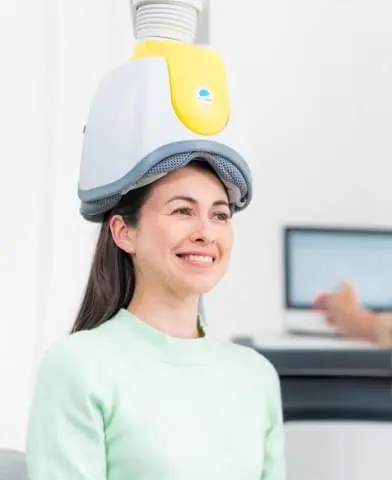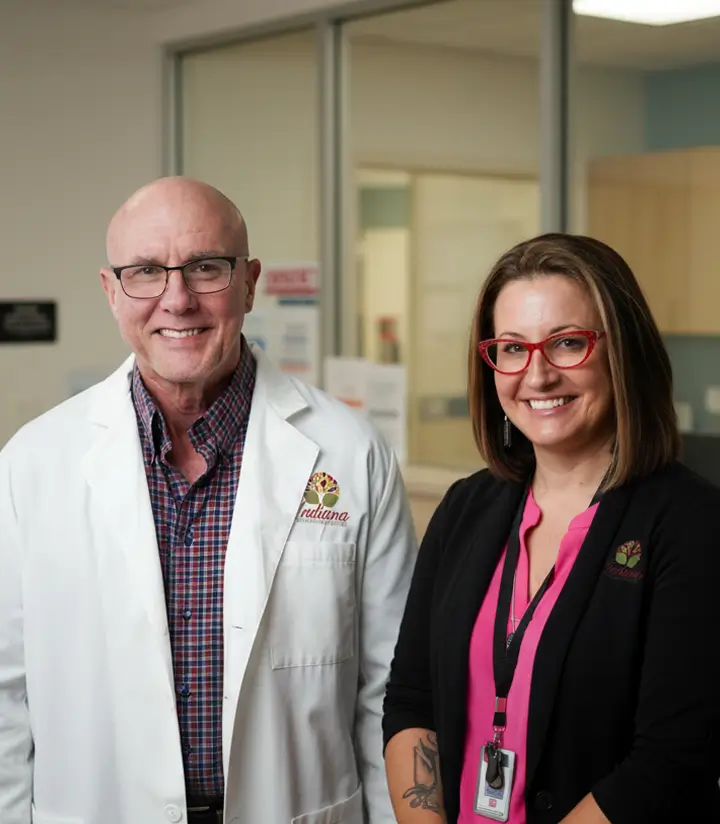
Therapies at Indiana Center for Recovery
Clinically Reviewed by:
At Indiana Center for Recovery, we believe in the power of comprehensive therapeutic approaches to guide individuals on their journey to recovery from addiction and mental health challenges.
We understand that overcoming substance abuse and addressing underlying issues requires more than just detoxification; it demands a multifaceted approach that addresses the mind, body, and spirit. Our facility offers a diverse range of therapeutic modalities tailored to meet the individual needs and preferences of our patients.
From evidence-based practices like Eye Movement Desensitization and Reprocessing (EMDR), Dialectical Behavior Therapy (DBT), and Cognitive Behavioral Therapy (CBT) to medication management, group therapy, and individual counseling, we provide a comprehensive array of services to address the complex nature of addiction and co-occurring disorders.

Importance of Therapy for Addiction and Mental Health
While the physical aspect of addiction can often be addressed through detoxification and medical intervention, the psychological and emotional components require specialized treatment to address underlying issues and promote lasting change. Therapy provides individuals with the tools, support, and insights needed to confront the root causes of their addiction, develop coping strategies, and build a foundation for a healthier and more fulfilling life.
Therapy provides a safe and supportive environment for individuals to process past traumas, unresolved issues, and underlying mental health disorders that may contribute to their addiction. It also allows individuals to learn and practice essential life skills crucial for maintaining sobriety and achieving long-term success. By embracing therapy as an integral part of the recovery process, individuals can begin a journey of self-discovery, growth, and transformation that leads to lasting positive change.
Individual Therapy
Within the safe and confidential space of individual therapy sessions at our facility, patients can explore their thoughts, emotions, and behaviors in-depth with one of our licensed therapists. This one-on-one approach allows for a tailored treatment plan that addresses each individual’s unique needs, challenges, and goals.
During individual therapy sessions, patients work collaboratively with their therapist to identify underlying issues contributing to their addiction, such as past traumas, unresolved conflicts, or co-occurring mental health disorders. Through empathetic listening, validation, and gentle guidance, our therapists help patients process these experiences, gain insight into their behavior patterns, and develop healthier coping strategies.
Additionally, individual therapy provides a space for patients to address specific issues or concerns that may be difficult to discuss in a group setting, such as shame, guilt, or relationship conflicts. Our therapists offer compassionate guidance and practical tools for managing cravings, triggers, and relapse prevention while also helping patients rebuild trust, improve communication skills, and strengthen their support networks.
Group Therapy
Led by our trained therapists or counselors, group therapy sessions provide a supportive and non-judgmental environment where our patients can explore their thoughts, feelings, and behaviors in relation to addiction and recovery.
One of the primary benefits of group therapy is the sense of camaraderie and belonging that it fosters among participants. Many individuals struggling with addiction may feel isolated or misunderstood, but group therapy offers a sense of community and solidarity with others who are facing similar challenges. By sharing their stories, struggles, and successes in a group setting, our patients can feel validated, understood, and supported in their recovery journey.
In addition to providing emotional support and encouragement, group therapy offers individuals the opportunity to receive feedback, gain new perspectives, and learn from the experiences of others.
Family Therapy
Family therapy is a crucial aspect of addiction treatment that recognizes the significant impact addiction has on familial relationships and dynamics. At our facility, we understand that addiction affects not only the individual struggling with substance use but also their loved ones. Family therapy provides a supportive and structured environment for families to come together, address underlying issues, and work toward healing and reconciliation.
The main goal of family therapy at Indiana Center for Recovery is to improve communication and strengthen relationships among family members. Addiction often leads to breakdowns in communication, trust, and boundaries within the family unit. Through family therapy sessions, families can learn effective communication skills, set healthy boundaries, and rebuild trust, fostering a supportive and nurturing environment for recovery.
Cognitive Behavioral Therapy (CBT)
Cognitive Behavioral Therapy (CBT) is a widely recognized and evidence-based therapeutic approach utilized in addiction treatment to address the underlying thoughts, beliefs, and behaviors that contribute to addictive patterns. At our facility, we integrate CBT into our comprehensive treatment programs to help individuals identify and challenge negative thought patterns, develop coping skills, and cultivate healthier behaviors.
One of the key principles of CBT is the recognition that our thoughts, feelings, and behaviors are interconnected. CBT focuses on identifying and changing maladaptive thought patterns, such as negative self-talk, irrational beliefs, and distorted perceptions, that contribute to addictive behaviors and emotional distress. Through CBT techniques, patients learn to challenge these negative thoughts and replace them with more realistic and adaptive ones, leading to a shift in emotions and behaviors.
CBT also emphasizes the importance of behavioral experimentation and skill-building to promote positive change. Our patients learn practical strategies and coping skills to manage cravings, cope with stress, and avoid relapse triggers. Therapists may utilize behavioral experiments, role-playing exercises, and homework assignments to help patients practice and reinforce these skills in real-world situations.
Dialectical Behavior Therapy (DBT)
Dialectical Behavior Therapy (DBT) is a specialized form of cognitive-behavioral therapy that has been highly effective in treating individuals with addiction and co-occurring mental health disorders.
DBT also incorporates skills training in four key areas: mindfulness, distress tolerance, emotion regulation, and interpersonal effectiveness. In mindfulness skills training, patients learn to ground themselves in the present moment and observe their thoughts and emotions without reacting impulsively. Distress tolerance skills help individuals cope with intense emotions and crises without resorting to maladaptive behaviors such as substance use. Emotion regulation skills teach patients how to identify and manage their emotions in healthy ways, reducing the urge to use substances as a coping mechanism. Interpersonal effectiveness skills focus on improving communication, setting boundaries, and building healthier relationships with others.
By equipping patients with practical skills for coping with cravings, managing stress, and navigating interpersonal challenges, DBT helps individuals build a strong foundation for lasting recovery.
Eye Movement Desensitization Reprocessing (EMDR)
Eye Movement Desensitization and Reprocessing (EMDR) is a therapeutic approach that has shown remarkable effectiveness in treating trauma-related disorders, including post-traumatic stress disorder (PTSD), which often co-occurs with addiction.
At our facility, we recognize the profound impact that unresolved trauma can have on individuals struggling with addiction, and we integrate EMDR into our treatment programs to address these underlying issues and promote healing.
EMDR therapy involves a structured eight-phase treatment approach that incorporates elements of cognitive-behavioral therapy (CBT), mindfulness, and bilateral stimulation to process traumatic memories and alleviate associated symptoms.
During EMDR sessions, patients recall distressing memories while simultaneously engaging in bilateral stimulation, typically through side-to-side eye movements or other forms of sensory input. This process facilitates the reprocessing of traumatic memories, allowing our patients to integrate them more adaptively into their understanding of themselves and their experiences.
Medication Management
Medication management is an essential component of comprehensive addiction treatment that aims to address both the physical and psychological aspects of substance use disorders. Our facility recognizes the importance of utilizing medications as part of a holistic treatment approach to support individuals in their recovery journey. Medications are prescribed based on a thorough assessment of each individual’s medical history, substance use patterns, and co-occurring mental health conditions.
One of the primary goals of medication management in addiction treatment is to alleviate withdrawal symptoms and cravings, helping individuals navigate the early stages of recovery with greater comfort and stability. Medications such as buprenorphine, methadone, and naltrexone are commonly used to manage opioid withdrawal and reduce the risk of relapse. Similarly, medications like acamprosate, disulfiram, and naltrexone may be prescribed to help individuals struggling with alcohol dependence maintain sobriety and prevent relapse.
In addition to managing withdrawal symptoms and cravings, medications may also be used to treat co-occurring mental health disorders that often accompany addiction, such as depression, anxiety, and bipolar disorder. By addressing these underlying psychiatric conditions, medications can help stabilize mood, reduce symptoms, and improve overall well-being, which in turn supports the individual’s recovery from addiction.
Frequently Asked Questions (FAQ)
What are management strategies for drug abuse?
Prevention strategies focus on educating individuals about the risks associated with drug use, promoting healthy coping mechanisms, and implementing policies to restrict access to drugs. Early intervention programs target at-risk populations, providing education, counseling, and support services to prevent the escalation of drug use. Harm reduction measures aim to minimize the negative consequences of drug use such as needle exchange programs and overdose prevention initiatives.
Does counseling work for drug addiction?
Counseling provides individuals with a supportive environment to explore underlying issues contributing to their addiction, develop coping skills, and make positive changes in their lives. Cognitive-behavioral therapy (CBT), motivational interviewing (MI), dialectical behavior therapy (DBT), family therapy, and group therapy are commonly used counseling approaches in addiction treatment. These therapies help individuals identify and challenge negative thought patterns and behaviors associated with drug use, strengthen motivation for change, improve emotion regulation and interpersonal relationships, and provide peer support and encouragement.
How effective is drug addiction treatment for people?
Drug addiction treatment can be highly effective for people when tailored to their individual needs and circumstances and delivered using evidence-based approaches. Comprehensive treatment programs that combine counseling, medication-assisted treatment (MAT), behavioral therapies, and support services address the complex factors underlying addiction and provide individuals with the tools and support they need to achieve and maintain recovery. Treatment effectiveness can vary depending on factors such as the type and severity of addiction, the presence of co-occurring disorders, and the individual’s motivation for change.
Get Help with Evidence-Based Therapies
Comprehensive therapeutic approaches are essential for recovery from addiction and mental health challenges, addressing the mind, body, and spirit through evidence-based practices. If you’re struggling with substance use disorder or co-occurring mental health conditions, professional treatment that includes individual therapy, group therapy, and specialized modalities can help you overcome addiction and build a foundation for lasting recovery. At Indiana Center for Recovery, we believe in the power of multifaceted treatment approaches and offer a diverse range of therapeutic modalities tailored to meet your individual needs and preferences.
Treatment begins with supervised medical detox to safely manage withdrawal symptoms, followed by intensive inpatient treatment or flexible outpatient treatment services. Our comprehensive addiction treatment programs include evidence-based therapies like Cognitive Behavioral Therapy, Dialectical Behavior Therapy, and EMDR therapy, along with medication management, individual counseling, group therapy, and family programs. Many individuals also face co-occurring mental health conditions, which is why our integrated dual diagnosis treatment combines mental health treatment with specialized addiction care to support comprehensive recovery.
Recovery from addiction and mental health challenges is possible with professional help and evidence-based therapies. We offer treatment locations throughout Indiana where you can access specialized therapeutic programs designed to address the complex nature of addiction and co-occurring disorders. Our compassionate team utilizes personalized care plans and ongoing support services to help you achieve your recovery goals. Call us today at (844) 650-0064 to learn more about our evidence-based therapies and take the first step toward a brighter future.






 100% Confidential
100% Confidential
